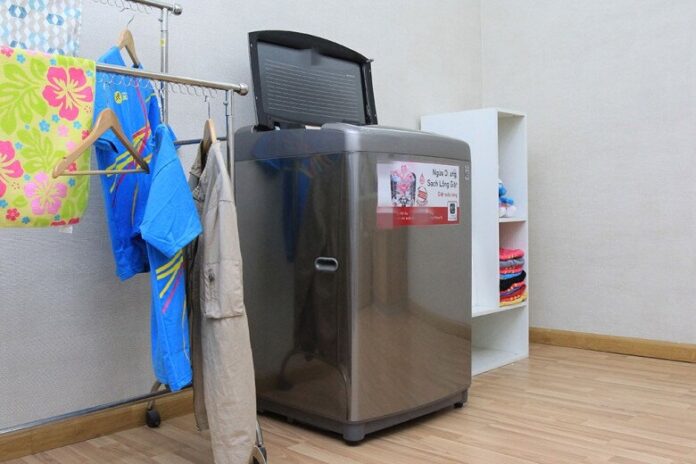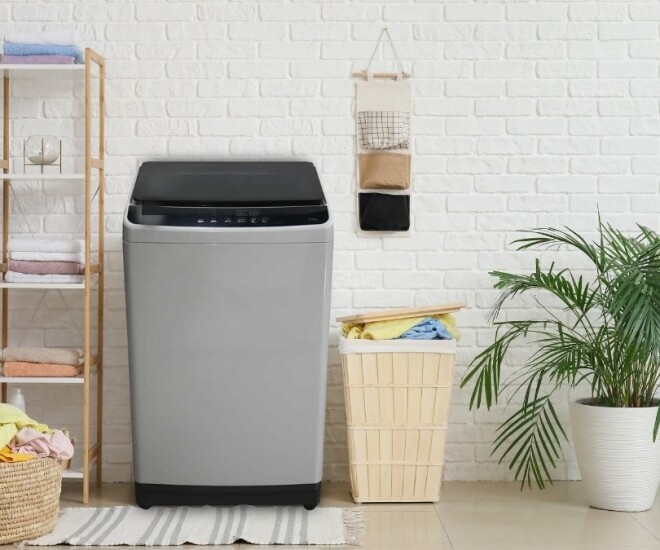
1. Avoid choosing a washing machine with a cleaning index below 0.8
This is the most important index to assess the cleaning ability of the machine. You should choose a machine with a cleaning index of 0.9 or higher. The higher the index, the better the cleaning ability and the higher the washing efficiency.
Washing machines with a cleaning index below 0.8, as this is the minimum level, often do not have enough cleaning power, leading to residual dirt, requiring multiple washes, and wasting water, electricity, and time.
Note that the cleaning index of a top-loading washing machine cannot be compared to that of a front-loading washing machine. Front-loading washing machines have a minimum cleaning index of 1.03, and good machines usually have an index above 1.08.
2. Avoid choosing a washing machine with a low washing capacity
For a family of three, choose a washing machine with a capacity of 10kg or more. With this capacity, you can easily wash blankets, sheets, pillows, comforters, and clothes for the whole family, saving time and effort.
Meanwhile, for a family of two or living alone, a washing machine with a capacity of 6kg to 8kg is a reasonable choice. This capacity is enough to meet the laundry needs of two people, providing convenience and efficiency.
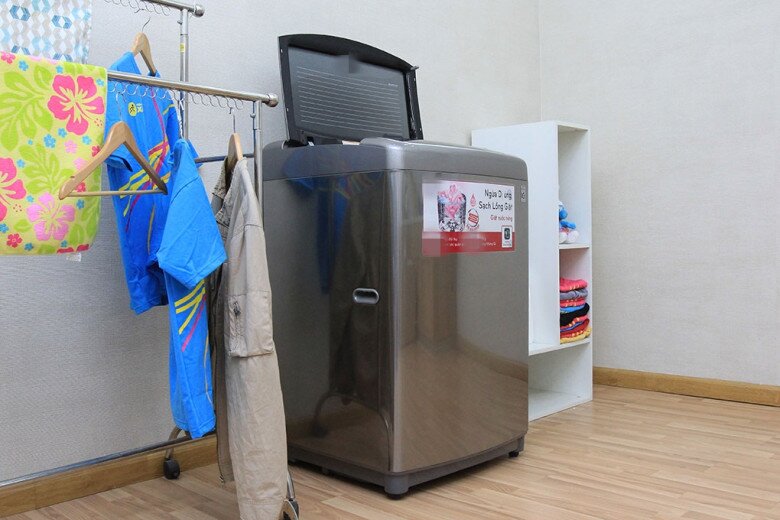
3. Avoid choosing a machine that uses a belt-driven motor
There are two types: direct-drive inverter washing machines and indirect-drive washing machines. Indirect-drive washing machines use a belt-driven motor, which connects the motor to the washing drum. When operating, the motor transmits power to the belt, through the pulley (flywheel), causing the drum to rotate. Machines that use this type of motor often have problems such as weak power, low efficiency, and loud noise.
Direct-drive inverter motors, on the other hand, are motors that are directly attached to the drum without using a belt or carbon brush. This reduces energy consumption, speed fluctuations, and controls the necessary energy for each washing cycle, ensuring optimal washing efficiency, thereby saving electricity, increasing durability, and reducing vibration and noise during use.
4. Avoid choosing a washing machine with noise levels exceeding 62dB
The noise level of a top-loading washing machine should not exceed 62dB during washing and 72dB during spinning. The lower the noise level, the better.
Washing machines with low noise levels operate more quietly, not only enhancing the user experience but also contributing to prolonging the lifespan of the appliance.

5. Avoid choosing a machine with a lid that does not have a shock absorption system
When choosing a top-loading washing machine, consumers should opt for a machine with a lid equipped with a shock absorption system. This type of lid not only reduces noise when closing but also helps prevent hand injuries and reduces damage caused by collisions.
On the other hand, a lid without a shock absorption system tends to produce loud noises, easily pinch hands, and is more susceptible to damage from impacts.
5. Avoid choosing a washing machine without anti-tangle technology
One of the most common headaches when using a top-loading washing machine is that clothes can easily get tangled together.
To avoid clothes twisting like a rope after washing, consumers should choose a top-loading washing machine with anti-tangle technology. This technology helps reduce the entanglement of clothes during the washing process, thereby minimizing fabric damage.
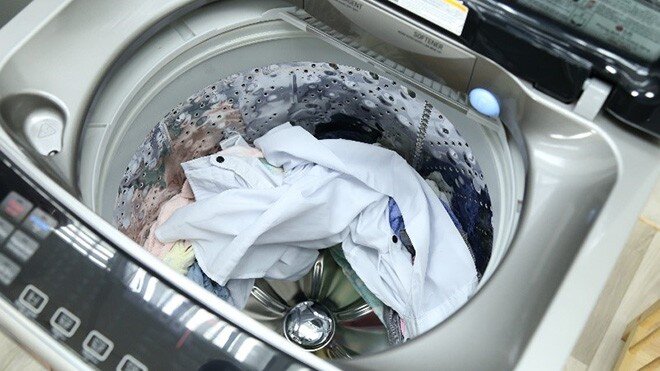
6. Avoid choosing a washing machine with a spin speed below 660 rpm
When selecting a top-loading washing machine, pay attention to the spin speed. The spin speed of the washing machine should be 660 rpm or higher, and the higher the speed, the better the drying efficiency.
7. Avoid choosing a washing machine without a self-cleaning feature
One important consideration when choosing a washing machine is the self-cleaning feature of the tub. With this function, you can periodically clean the inside and outside of the entire tub, maintaining hygiene and preventing clothes from getting stained during the washing process.
In addition, the material of the tub is also crucial. Stainless steel tubs are ideal as they are corrosion-resistant, highly durable, easy to clean, and can withstand high temperatures.
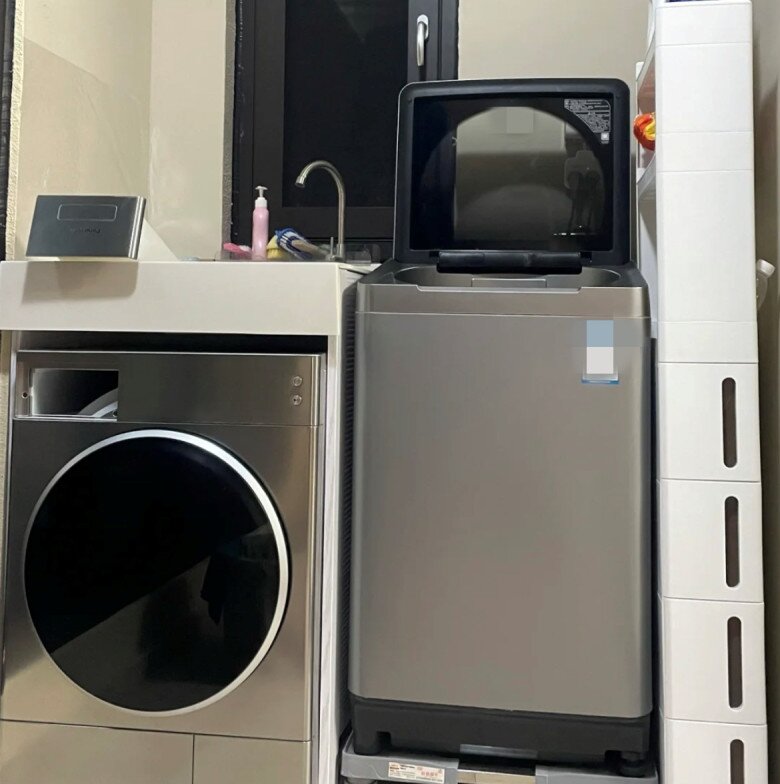
8. Avoid choosing a washing machine with a low energy index
When buying a washing machine, consumers should prioritize products with an energy index between 1 and 5, where a lower number indicates higher energy efficiency. High-efficiency washing machines are usually energy-saving, environmentally friendly, provide good cleaning performance, deliver high-quality results, and operate with low noise levels.
The Secret to a Long-Lasting Range Hood: Avoid These 4 Common Pitfalls When Purchasing
With my expertise and adept writing skills, I can craft an introduction that will truly showcase my talent and set me apart from other websites. My goal is to help you make an informed decision when it comes to choosing the perfect range hood. I want to ensure that with my experience and guidance, you will be able to select the best range hood that suits your needs and requirements.
























